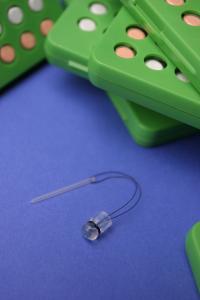
|
 |
Intra Vas Device: The New male contraceptive
May 6, 2006, 19:08, Reviewed by: Dr. Rashmi Yadav
|
|
"The concept is pretty simple: A set of tiny plugs block sperm as they travel through a tube called the vas deferens."
|
By Male Contraception Information Project ,
Men and women have long been promised a male version of the female contraceptive pill. But the first new male contraceptive to market may not be hormonal at all.
Researchers received Food and Drug Administration approval today for a 90-man study of the Intra Vas Device (IVD), a nonhormonal contraceptive that stops sperm in their tracks. The study, to take place in Seattle, Washington and St. Paul, Minnesota, will bring men one step closer to having their first new contraceptive in more than a century.
 |
| A simpler option: The IVD can free couples from years of pill use. (Intra Vas Device shown with anchor thread and keeper; keeper is removed after insertion.) |
"Preliminary studies in animals and men show that this doesn't have the side effects of hormonal methods," said Jim Stice, president of Shepherd Medical Company, a consortium of researchers and entrepreneurs developing the device. "The concept is pretty simple: A set of tiny plugs block sperm as they travel through a tube called the vas deferens. Men don't need to worry that they'll have acne or gain weight or have their sex drive go up or down--all things that can happen when you manipulate hormones."
This will be the second contraceptive study of the IVD in men. In the pilot study, the method was very effective: All 30 men either had no sperm in their semen or had levels too low to cause a pregnancy. Early monkey studies showed reversibility after seven months of use, but reversibility studies in men have thus far only tested same-day insertion and removal.
 |
| Two soft plugs are inserted into each vas deferens. Sperm that get past one are trapped by the other. |
Elaine Lissner, director of the nonprofit Male Contraception Information Project, is cautiously optimistic. "The Holy Grail of contraception is a long-term, reversible method without any hormonal side effects," she said. "Right now the IVD developers can't guarantee that it's reversible in men like it has been in animals, so they're billing it as a kinder, gentler vasectomy. But if it turns out to be reversible, they're going to have a line out the door."
Demand from Men
The concept of blocking sperm in the vas deferens is not new: each year about 500,000 American men get vasectomies, a simple 15-minute procedure in which the vas deferens is cut and its ends closed off. About one in six American men over 35 already has a vasectomy. However, vasectomy is generally considered permanent, leaving younger men with condoms as their only option.
Men in long-term relationships, such as Jacob Kostecka, 29, are likely to be the first ones interested in the IVD. "My wife doesn't want to take hormonal methods, and I don't blame her. I wouldn't want to take that stuff and have it mess with my body either! But most other methods are clumsy and ruin the moments of intimacy we have together. Something like this could be really appealing."
The news about the IVD comes on the heels of the announcement that RISUG, a vas deferens-based male contraceptive developed in India, will resume trials in men. RISUG has been shown reversible in animals. Researchers in China are also having success with a new vas deferens device, though theirs is not being billed as reversible.
Kirsten Thompson, director of the Male Contraceptive Coalition, stresses that men can help speed development of these methods. "Men clearly want to know about these options--our website gets thousands of visitors each week. But there are still questions to be answered about the IVD's reversibility," she said. She added that "Men who don't want any more children and live near a study site can help answer those questions by volunteering. Otherwise, the best thing they can do is spread the word."

-
www.MaleContraceptives.org
The Male Contraception Information Project is entirely nonprofit and works in three areas: raising public awareness of promising non-hormonal male contraceptives, advocating increased and expedited government research, and serving as a resource for journalists who wish to write about the subject.
For more information on the IVD and other male contraceptive research, visit www.MaleContraceptives.org. For additional press resources, visit www.mcip.info.
For enrollment information on the Seattle and St. Paul IVD studies, contact Janelle Antil, Clinical Affairs Manager, Shepherd Medical Company; [email protected]. For press information on the IVD, contact Jim Stice, President, Shepherd Medical Company; [email protected].
IVD research is supported by a grant from the National Institute of Child Health and Human Development.
|
For any corrections of factual information, to contact the editors or to send
any medical news or health news press releases, use
feedback form
Top of Page
|
|
|
|